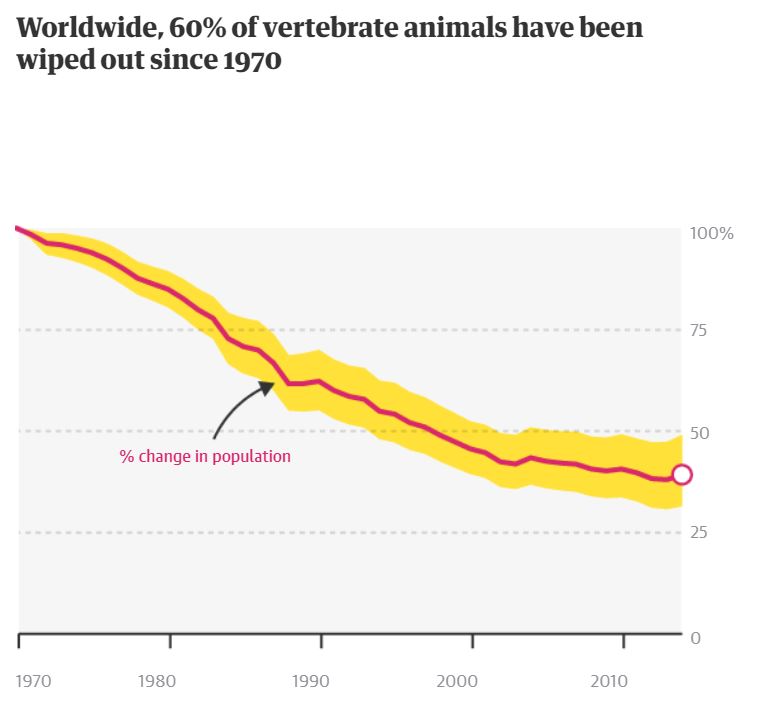The Living Planet Index (LPI) was released on the 29th of October 2018 and, in short, stated that we have screwed up our planet. But before I tell you why, I’ll tell you what the Living Planet Index is. Since 1998, WWF and ZSL have been monitoring populations of a whole range of species, 4005 species to be exact, with results being summarised in the Living Planet Report. This is done to monitor the health of our planet and investigated through looking at trends of 16,704 populations. A decline has been seen in populations since the start of the LPI, but in the 20th anniversary edition of the LPI, they found some quite shocking statistics.
Since 1970 there has been an overall decline in populations of 60%. This is up to 1000 times higher than the background extinction rates, which basically means that we’re causing it, not natural factors. This decline isn’t even everywhere, Central and South America show declines of 89% since 1970, compared to the global average of 60%. This is because the majority of beef, soy, and crops for cattle is produced here causing large deforestation, furthering climate change by getting rid of the one thing that can stop it: trees. The rate of deforestation in the Amazon alone is 54 square miles a day, since you asked. Why does this matter? The Amazon rainforest holds 10% of the world’s known wildlife, 3 new species are found per day in the Amazon, some of which have medical applications. So not only is the loss of species detrimental to whole ecosystems due to species interactions, we could also be losing species we haven’t even discovered yet. Some of which may benefit us in terms of medical applications and food. And if you’re still not convinced of the benefit of the Amazon, sloths live there and who could want to kill a sloth? But deforestation and climate change is doing just that.
Deforestation is not the only cause of the drastic loss of species. Freshwater species have also seen a decline of 83% since 1970. Decline in freshwater species is down to a number of factors: habitat modification, overfishing, diseases, invasive species, pollution, and the big whopper that is climate change.
It isn’t all doom and gloom, though, as there are a number of things we can do to help minimise our footprint on earth. We can change our consumption patterns. Reducing the amount of meat you eat in a week by a single day would help greatly as producing 500g of meat requires 5kg of grains to feed the animal. This uses land and water and produces greenhouse gas emissions. Beef results in 105kg of greenhouse gases per 100g of meat (essentially two burgers) compared to tofu which only produces 3.5kg of greenhouse gases per 100g. Additionally, land for livestock makes up 83% of all farmland, so a pretty large percentage then. By changing our consumption, demand will be reduced resulting in a reduction in the production of cattle ranches and thus lowering the amount of deforestation.
It’s also important to reduce our carbon footprints as much as possible, so walk where you can, turn off the lights when you leave a room, and reuse products as much as possible to reduce the natural resources that go into making them; just think of the polar bears.
With the talk of plastic killing our oceans (which don’t get me wrong, is a major issue), other factors, such as climate change, have been put on the back burner and forgotten about by governments. But the conclusions of the LPI are a stark reminder that plastic is not the only impact we have had on our planet. We also need to focus on other aspects of our behaviour to prevent essentially a global wipe out of all species, ourselves included. So, keep this in mind because according to WWF, we are the last generation who can prevent drastic loss of species and reverse the trend, quite an important role. No pressure then…
image source: https://portside.org/node/18532/printable/print

